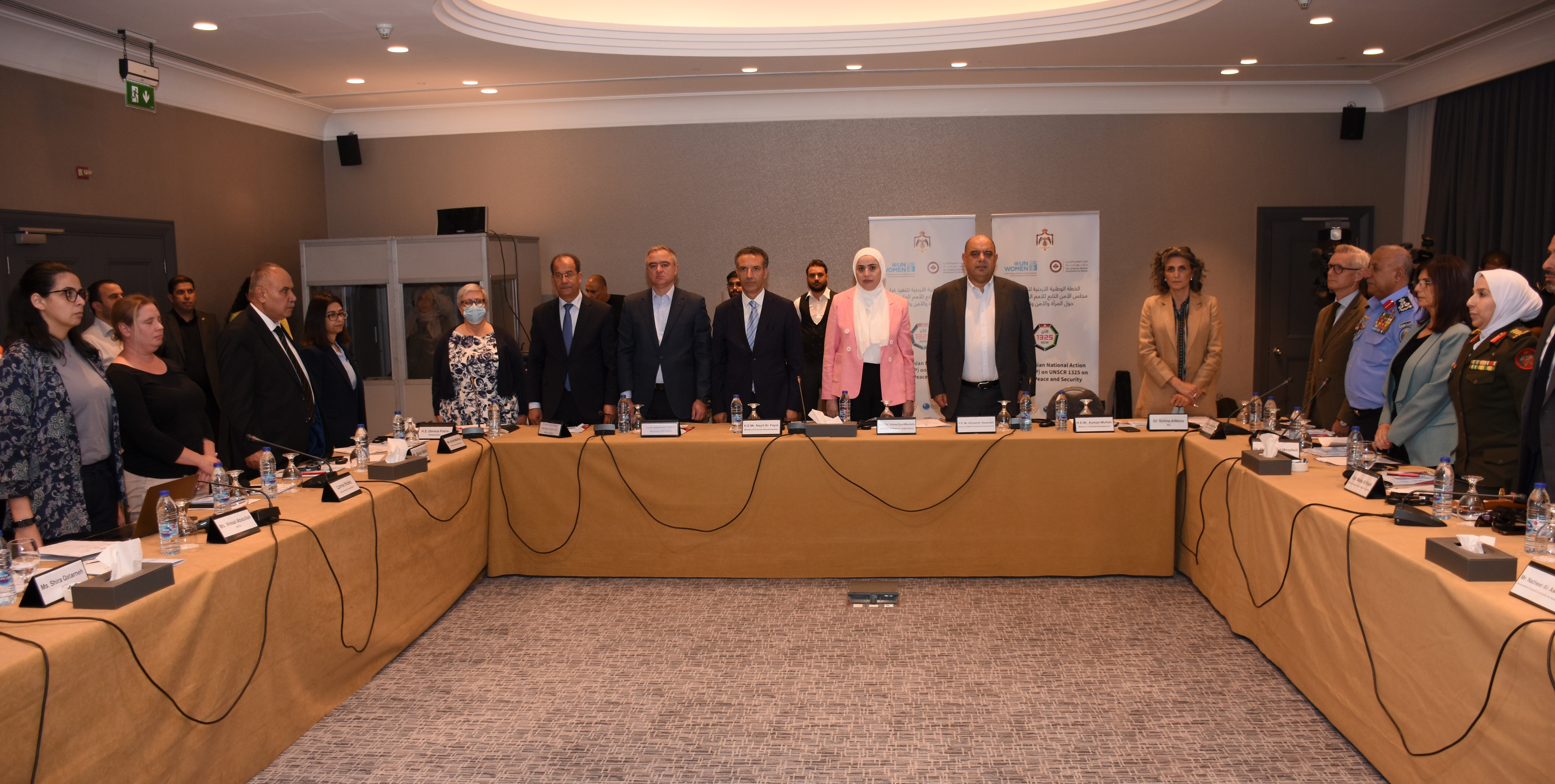JONAP PROGRAMME BOARD PRESENTS FRAMEWORK FOR THE SECOND NATIONAL ACTION PLAN ON WOMEN, PEACE AND SECURITY
Date:

On behalf of the Chair of the Inter-Ministerial Committee (IMC) on Women’s Empowerment, Her Excellency Wafa’a Bani Mustafa, Minister of State for Legal Affairs, Dr. Salma Nims, the Secretary General of the Jordanian Commission for Women (JNCW), convened the Programme Board of Jordan’s National Action Plan (JONAP) on the United Nations Security Council Resolution (UNSCR) 1325 on Women, Peace and Security (WPS) on Thursday, 21 July 2022.
JONAP, recognized globally as a good practice in United Nations Secretary General Annual Reports, has contributed to regional security and stability as a catalyst for replication on global and regional levels. Since its inception, women have been represented in greater numbers in the security sector and in decision-making roles, with significant advances made in the gender responsiveness of the justice sector. The programme has reached 21,181 women and girls with prevention and protection services on gender-based violence.
Recognizing the importance of gender equality and the role of women in peace and security, JONAP represents a unique framework that brings together the Government, security and military sectors, civil society organizations and other national institutions to create a gender-responsive security sector, with meaningful participation of women in peacekeeping, peacebuilding, preventing radicalization and violent extremism and access to gender-sensitive humanitarian services by Jordanians and Syrian refugees.
On behalf of the donor consortium supporting the JONAP implementation, which includes the Governments of Canada, Cyprus, Finland, Norway, Spain and the United Kingdom, H.E. Donica Pottie, Ambassador of Canada to Jordan, commended Jordan’s commitment to the Women, Peace and Security agenda, and said, “JONAP is also an excellent example of partnership. We commend UN Women and JNCW for their effective and insightful implementation, their diligent collaboration with all partners and their commitment to ensuring a broad and comprehensive consultation process to inform the next phase”.
Dr. Salma Nims, Secretary General of The Jordanian National Commission for Women, provided an overview of the achievements and lessons learned from the implementation of JONAP, highlighting that since 2018, the participation of women across Jordanian security and military institutions, has increased by 2.2 per cent. She also noted the increase in the representation of women in UN peacekeeping missions from 8.65 per cent since the beginning of JONAP to 11.5 per cent in December 2021. She presented the framework for the next phase of the programme, JONAP II, which will continue to leverage the national ownership and leadership to advance WPS agenda, with strengthened focus on gender, climate, and security as well as youth, peace and security.
Brigadier General Dr. Mutasem Abu Shatal, Assistant for Administration and Human Resources, Public Security Directorate and Colonel Maha Al-Nasser, Director of the Military Women's Affairs Department, Jordanian Armed Forces acknowledged the achievements made by women in the security sector agencies, which have also been actively engaged in enhancing national protection mechanisms, particularly prevention and protection services for survivors of domestic violence, reaffirming their commitment to foster an enabling environment for women’s participation. Dr. Nawal Al Jawhari, Director of Judicial Institute in Jordan, commended the close partnerships fostered between the justice sector and key stakeholders through JONAP.
Representatives from the civil society, Ms. Wesal Abduallah from Arab Woman Organization, on behalf of Coalition 1325, Ms. Hiba Haddaden, Madaba Cultural Forum for Children, on behalf of community-based organizations and grassroot women’s groups, and Ms. Nuha Muhreiz, representing the Jordanian National NGOs Forum, highlighted the importance of building the capacity of civil society organizations through JONAP, providing recommendations on localization of the principles of WPS for the next phase of the programme.
Ms. Aisha Mukhtar, Deputy Representative of UN Women in Jordan, praised the strength of national ownership of the plan in her concluding remarks regarding the significance of the Jordanian national plan as a model for its comprehensive design, cross-sectoral cooperation, and effective financing mechanism. She stated, "We look forward to continue our excellent cooperation in the second phase to build on the tangible gains made thus far and to accelerate and bolster the implementation of Security Council Resolution 1325 in Jordan."
The meeting concluded with the approval of the annual work plan for the first Jordanian national plan 2022 and the presentation of a framework for the next phase, for the second Jordanian national plan to activate Security Council Resolution 1325, which will continue to benefit from national ownership and leadership to advance the women's, security and peace agenda with a stronger emphasis on gender, climate, and security, in addition to youth, peace, and security.
Available in Arabic here.
####
For more information, please contact:
Maliha Bassam
Partnerships and Resource Mobilization Specialist
UN Women Jordan Country Office
Email: [ Click to reveal ]